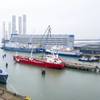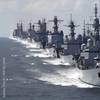New Research Will Aid Naval Planners
The Office of Naval Research Global (ONR Global) announced Jan. 30 a grant to the University of Melbourne that will provide new insights into ocean conditions-crucial information for Navy planners involved in tactical and strategic decision-making.
The project is intended to improve understanding of conditions in the Indian Ocean, including validating satellite data on salinity, or salt, levels. Confirming satellite findings with actual field-level research is an area scientists have deemed essential to improving the Navy's oceanographic models.
The research is in collaboration with Kenyan and Indian scientific organizations.
"The major goal of this kind of research is to be able to provide the best information possible on the environmental, or battlefield, conditions, so that tactical and strategic decisions can be properly made," said Dr. Augustus Vogel, the ONR Global program manager coordinating the research. "It is because of this kind of information that U.S. Navy ships can now more easily avoid hurricanes, typhoons and cyclones, for example."
Vogel noted that improved understanding of data from satellites will give Navy planners more confidence in the information received.
"This research will help us calibrate satellite data so that we are confident in what the data tell us," he said. "Field data are the best, but we can use satellites to study large areas that are not easily covered with a ship."
The need for improved environmental ocean research has long been recognized by the military and civilian seafaring community. Naval researchers point out that insufficient data on water and weather conditions can impact even the largest vessels, and recall the tragic losses of ships under Adm. William Halsey in World War II in storms that today would be easier to predict.
As with many ONR Global efforts, there will be a double benefit to the research, officials say, as the University of Melbourne grant represents increased ties between U.S. and allied scientists. The grant is an example of the kind of support President Barack Obama called for in his recent State of the Union speech, when he said: "Let's remember that our leadership is defined not just by our defense against threats, but by the enormous opportunities to do good and promote understanding around the globe."
ONR Global scientists work around the world, and its personnel are often referred to as "scientific ambassadors" because of the goodwill created during shared research.
"We are proud to work with researchers at the University of Melbourne on this important effort to advance understanding of environmental conditions," said Capt. Mike Smith, commanding officer of ONR Global. "It is these kinds of collaborations that help advance the frontiers of knowledge, and strengthen ties between the U.S. and partner nations through shared research."
The command has offices in Japan, Singapore, the Czech Republic, the United Kingdom, Chile and Brazil. It also sends science advisors out with the U.S. fleet and forces to help determine new ways science and technology can benefit the American Sailor and Marine.
Some of the command's work includes advances in mine-hunting capabilities for unmanned aerial vehicles; early tsunami detection; and increased emission controls for engines; and more.













